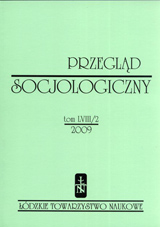Socjologia w Europie Środkowo-Wschodniej czy socjologia wschodnioeuropejska?
Sociology in Central and Eastern Europe or East/Central European Sociology
Author(s): Janusz MuchaSubject(s): Social Sciences
Published by: Łódzkie Towarzystwo Naukowe
Keywords: origins of sociology; national traditions; universal science; Central and Eastern Europe; Poland
Summary/Abstract: Sociology as an institution emerged in Western Europe in the mid-19th century, aiming at the analysis of societies in the process of industrialization. With the expansion of capitalism and industrialism, it also expanded into other regions of the world. Central and Eastern Europe (CEE), Poland being an example, was a region of delayed industrialization. It was an area in which Ethnology rather than Sociology was initially interested. The intellectual milieus of the region were very well educated and cosmopolitan. Many Western European ideas were studied here and attempts to implement them were strong. At the same time, many CEE intellectuals underlined the specific character of the region. As a consequence, within the spectrum of attitudes toward the scholarly analysis of CEE societies, distinguish two “ideal-type” options can be distinguished. One stressed that it was possible to build academic Sociology in, and of, CEE, based on the rules of universal Sociology, developed in the West. Other ideas opted for the construction of CEE Sociology, which would be based on the specific historical experiences of the region. For the second option, CEE Sociology was to be an alternative to Western Sociology or social sciences in general. The paper concentrates on the Polish case without neglecting other cases. It discusses both historical and present situations, that have emerged since 1989. CEE became much more open as a study area for Western scholars, who have done much of their own research here in collaboration with their colleagues from the region itself. The ways in which this collaboration has been perceived by the “native” scholars is also a topic of analysis.
Journal: Przegląd Socjologiczny
- Issue Year: 58/2009
- Issue No: 2
- Page Range: 9-31
- Page Count: 23
- Language: Polish

